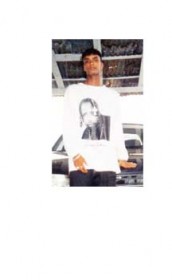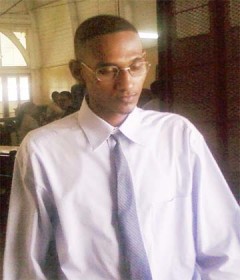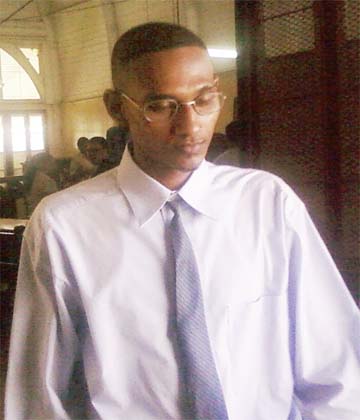-accused to testify against other in return for lighter sentence
Murder accused Daywan Kawal yesterday became the first defendant to sign a plea bargaining agreement under which he will be eligible for a lighter sentence in return for testifying against a co-accused.

Kawal’s attorney Peter Hugh made the proposal to Director of Public Prosecu-tions (DPP) Shalimar Ali-Hack in early April.
Justice William Ramlal yesterday accepted the agreement at the Demerara Assizes.
Proceedings commenced with the judge examining the agreement. However, Ali-Hack’s name was not printed under her signature in the document and Ramlal subsequently asked both Hugh and State Prosecutor Judith Mursalin to confirm that it indeed belonged to the DPP.
Kawal, called Avinash, of Third and Nile streets, Grove, East Bank Demerara was indicted for the murder of taxi driver Deonarine Sukhdeo. Sometime between the 19 and 26 of April, 2006 the defendant was involved in the unlawful killing of Sukhdeo.
As part of the conditions in the plea bargaining agreement, Kawal admitted that he was involved in the killing but attributed the stab wounds which caused Sukhdeo’s death to a co-accused who is yet to be indicted.
He has agreed to testify again his co-accused provided that he is given a sentence of between five and eight years. Kawal has spent more than four years in prison already.
Justice Ramlal explained to the parties involved that he would proceed with great care in handling the procedures since this was the first time the plea bargaining deal was being used. He described it as a “ground breaking” event.

“Did anyone force or induce you into entering into this agreement?” This was the first in a long line of questions which the judge asked Kawal. He followed with similar questions all focused on determining that Kawal was aware of the nature, substance and consequences of the agreement into which he’d entered. Next Kawal was asked whether his lawyer was present throughout the signing of the agreement. He confirmed that Hugh was with him.
The prosecutor was questioned next. She was asked to confirm that to her knowledge Kawal was not forced, induced, or misled into signing the plea bargain. Mursalin assured the judge that the defendant had signed the agreement of his own free will.
“Remember there are also offences under this act,” Justice Ramlal reminded those in court.
Before the deal could be struck the DPP had to inform and acquire consent from the relatives of the deceased. Mursalin, when questioned by the judge, explained that Ali-Hack had spoken with Sukhdeo’s parents.
At first, she said, Sukhdeo’s parents were hesitant about agreeing to the deal and said that they wanted to see justice done. However, after the benefits of the deal were explained to them Satnarine and Pamela Sukhdeo agreed. The principle reason for the agreement is that Kawal will testify against the other accused and his accomplices.
Briefly summarizing the facts of the case for the court, Mursalin reported that on the morning of April 19, 2006 Sukhdeo left his Block X, Section B, Diamond New Housing Scheme, East Bank Demerara home and failed to return. Sukhdeo, she said, was a taxi driver who worked the Timehri route.
His body was discovered in a clump of bushes a short distance from his car, HB 3236, on a trail in Kuru-Kuru just off the Soesdyke/Linden highway. The body was in a state of decomposition.
Kawal was arrested on April 24 following investigations. It was he who took police to the location where Sukhdeo’s body was found. He gave a written caution statement to police on April 25 but did not admit to killing Sukhdeo. Kawal, according to the prosecutor, said they had hired Sukhdeo to take them to the junction and the car had become stuck in the sand. A witness had reported seeing Sukdeo in the company of Kawal and the others.
Later, Kawal took police to his Grove home where he handed over the documents for Sukhdeo’s vehicle. He was also in possession of the man’s driver’s licence. Kawal, the prosecutor said, is blaming the other accused for the four stab wounds which resulted in Sukhdeo’s death. On April 6 this year, almost four years after the taxi driver’s murder, Hugh wrote to the DPP proposing a plea bargain for his client.
Both the defence and prosecution declined to submit arguments based on either the mitigating or aggravating circumstances for the minimum or maximum sentencing, respectively, based on the agreement. Hugh and Mursalin said that they will be guided by the ruling exercised by the court without getting into their respective arguments.
Justice Ramlal will now examine the case records to determine the mitigating or aggravating circumstances before he begins deciding upon Sukhdeo’s sentencing which is scheduled to take place next Monday morning.
Meanwhile, during yesterday’s proceedings the judge asked Kawal whether there was anything he wished to say. He declined at first but after being prompted by his attorney he apologized to the parents of the deceased
“I don’t accept anything from you…whatever you already done, you done,” Pamela Sukhdeo told him.
At this, Justice Ramlal told her that she has already decided to accept the plea bargaining agreement and was not required to publicly accept an apology from the man. He also pointed out that the Plea Bargaining Act makes provision for Kawal to withdraw from it before his sentencing.
It was announced at the end of April last year that plea bargaining and plea agreement procedures could be used by the Police and other relevant agencies and departments. An order bringing into operation the Criminal Procedure (Plea Bargaining and Plea Agreement) Act 2008, No. 18 of 2008 was signed by Minister of Home Affairs Clement Rohee. The legislation was passed in the National Assembly on October 16, 2008.

